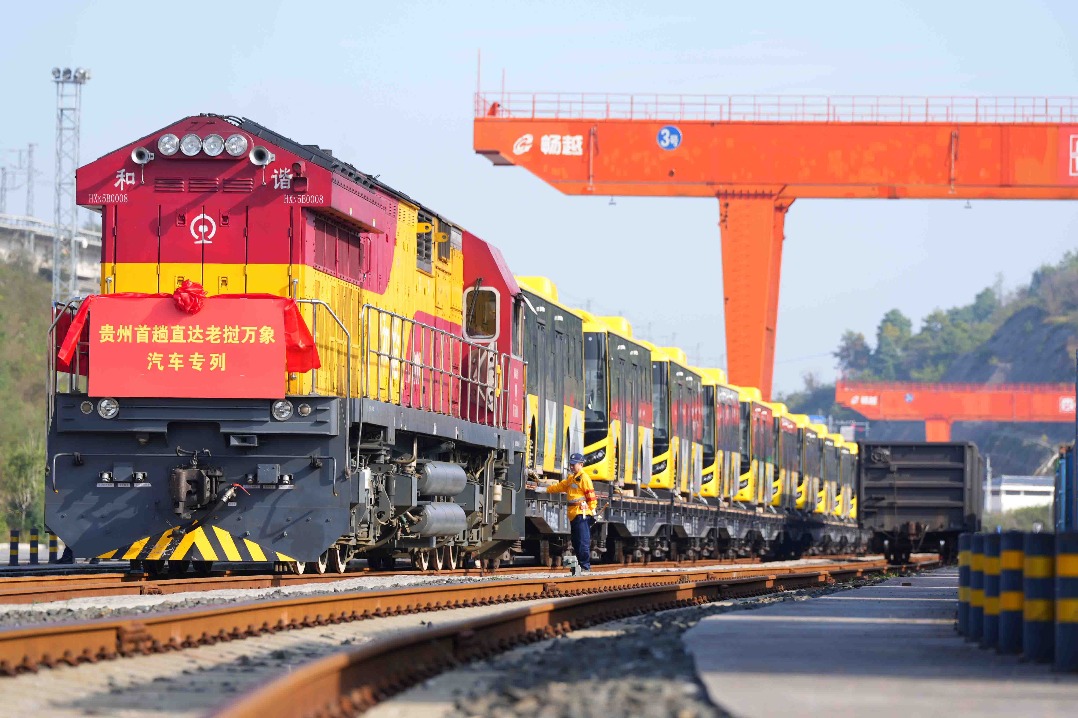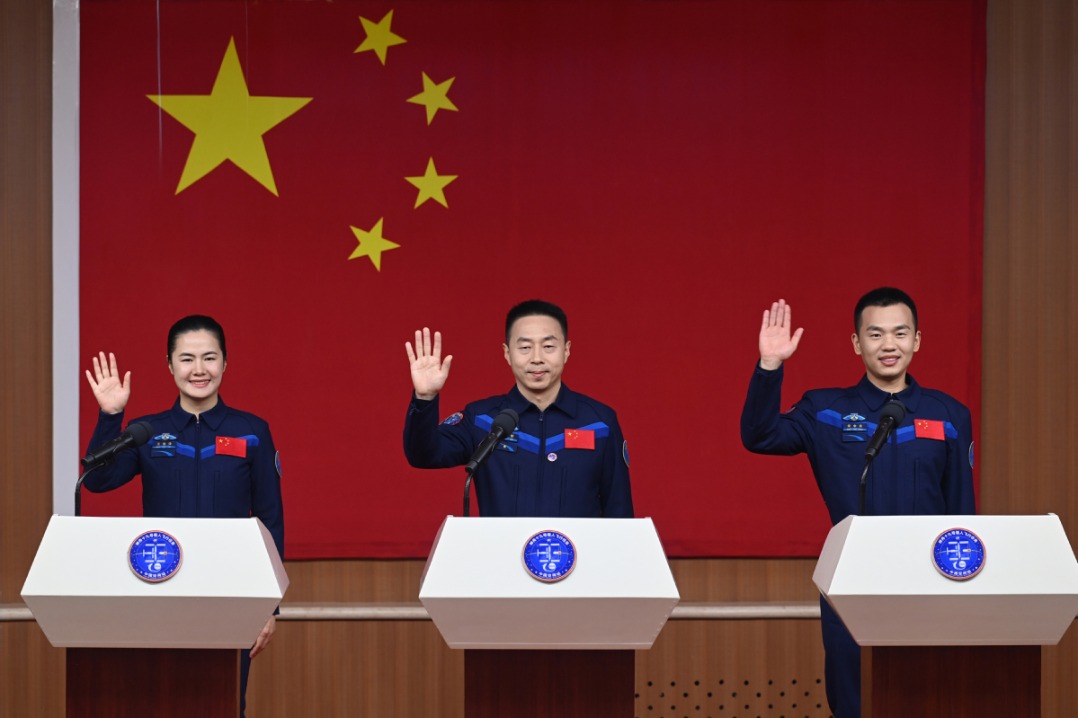Former East German leader hails China's success


Country a beacon for others as it promotes world peace, says Krenz
What does China in the new era look like? Egon Krenz, 82, a former East German leader, offers a unique perspective.
Krenz, the last communist leader of East Germany in the final months of 1989, said that in a world full of uncertainty and turbulence, China represents a fortress safeguarding peace and stability. This is demonstrated by its commitment, he added, to building a community with a shared future for mankind.
A committed socialist, Krenz became general secretary of the Central Committee of the ruling Socialist Unity Party of Germany on Oct 18, 1989, but was forced to resign shortly after, when the Berlin Wall fell.
He still believes that the collapse of the Berlin Wall didn't terminate socialism in the world, as he has witnessed socialism with Chinese characteristics leading China to become the second-largest economy in the world.
"The failure of socialism in Europe was a heartbreaking tragedy, but I am glad to see that socialism with Chinese characteristics is still thriving and full of vigor and vitality," he said. "China has set a role model for the rest of the world."
Known as "an old friend of the Chinese people", Krenz has visited China nine times since his first trip in 1989, which brought him to major cities like Beijing and Shanghai, as well as smaller cities like Xinxiang in Henan province and Jinhua in Zhejiang province.
His last trip to China took place in August, when he was in Beijing for the launch of the Chinese edition of his book China, Wie ich es sehe (China, as I see it), which was first published in March 2018 in Germany.
In the book, Krenz uses his own experiences in China to illustrate the economic and social progress the country has made in various stages, and by citing the theories of scientific socialism created by German philosophers Karl Marx and Friedrich Engels to explain why socialism is flourishing in China and how he views China in the new era.
Krenz said the publication of the Chinese version of the book is a gift to mark the 70th anniversary of the founding of the People's Republic of China. "I wrote this book to introduce the real China to Germans as the image of the country in reports by the Western media, including some German media, is one-sided. They are reluctant to admit that a socialist country is able to record outstanding achievements," he said.
Krenz cited an example in the preface of his book to illustrate the viewpoint. China is the top trade partner of Germany, however, the strong economic connections fail to help his countrymen view China, its history and reality, in an unbiased way, he said.
The elder statesman remembers the day when the 19th National Congress of the Communist Party of China opened in October 2017. At that meeting, deeply significant to the Chinese people, President Xi Jinping, who is also general secretary of the CPC Central Committee, announced that socialism with Chinese characteristics had entered a new era that represented a historic juncture in China's development.
At that time, Krenz was in a hotel in Beijing and read reports in the international media about the event.
He wrote in the beginning of his book that it was a rainy day, with fog and haze, and he found the German media used the meteorological conditions to discredit the CPC and the significance of the Party's meeting.
The reason behind such an "absurd phenomenon" is because people tend to judge China on the basis of German or European perspectives and standards, Krenz said.
"It reveals a contradictory phenomenon that, although China is the biggest trade partner of Germany, its image to German people is surprisingly negative," he wrote. "It is hard for German elites to acknowledge that a socialist country could make such remarkable achievements as they believe capitalism naturally triumphs over socialism."
Krenz said he was particularly impressed by the work report delivered by Xi at the opening of the 19th CPC National Congress.
He wrote in the preface of the book that Xi's speech was a kind of a socialist guideline that is relevant to China's modernization and has enormous significance.
"To people who underwent the failure of socialism in East Germany like me, the guideline is closely linked to our hope for the rise of socialism, and the hope for China's socialist path to be a strong force to guard against imperialist policies," Krenz said.
China has set "Two Centenary Goals" for the nation's rejuvenation: to finish building a moderately prosperous society in all respects by the time the CPC marks its centenary in 2021, and to build China into a modern socialist country that is prosperous, strong, democratic, culturally advanced and harmonious by the time the PRC celebrates its centenary in 2049.
At the 19th CPC National Congress, Xi called on the Party and the nation to make efforts to deliver on the "Two Centenary Goals", strive for the great success of socialism with Chinese characteristics for a new era, and work tirelessly to realize the Chinese Dream of national rejuvenation.
"These visions are more pragmatic than any other social development plans I have seen," Krenz said.
While China might face difficulties in implementing the goals, there is no need to worry as the country has the ability to take all measures to reduce or even eliminate possible risks it might face, he added.
Krenz's judgment came as a result of his strong belief in the victory of socialism, even after being sentenced to six-and-a-half years' imprisonment in 1997 for Cold War crimes, specifically his responsibility for the manslaughter of Germans attempting to leave East Germany over the Berlin Wall.
He retired to the small town of Dierhagen in Mecklenburg-Vorpommern upon his release from prison in late 2003.
He attributed the success of China's socialist system partly to the reform and opening-up policy it has adopted since the late 1970s. The policy has defined the development goal for socialism, he said, adding that China's strength in the economy, politics and military has ensured the country can follow its own development path.
Particularly, he said, China takes the welfare of the people as its fundamental goal for development, and the policies implemented by the CPC and the Chinese government are ultimately to improve people's well-being.
Krenz said that "the Chinese Dream is characterized by down-to-earth efforts for the well-being of the people". This vision makes him believe that China will have a brilliant future.
"Under the leadership of the CPC, the country is steadily moving forward to realize its development goals, and at the same time, making contributions to promoting world peace, stability and development," he said.
- Typhoon Kong-rey expected to make landfall in Zhejiang, Fujian on Thursday
- China celebrates maiden international flight of home-grown ARJ21 jetliner
- Chinese scientists make discovery in midlatitude Asian deserts
- China committed to global advancement of new technology in navigation
- Guizhou-made new energy buses exported to Vientiane, Laos
- Former Guizhou Party chief sentenced





































